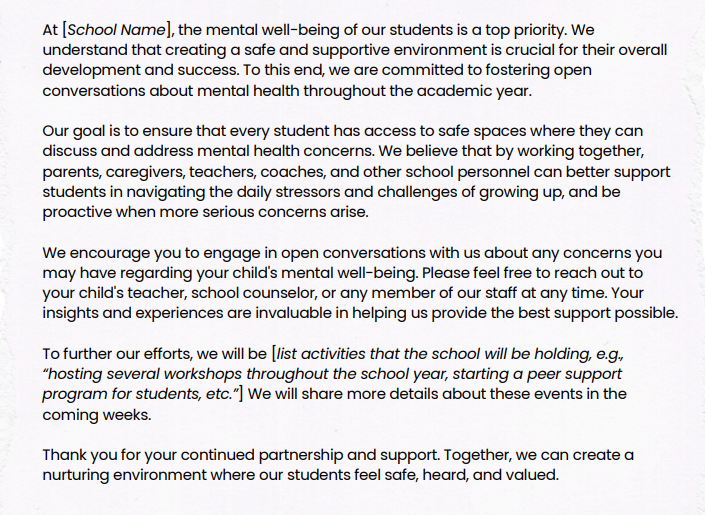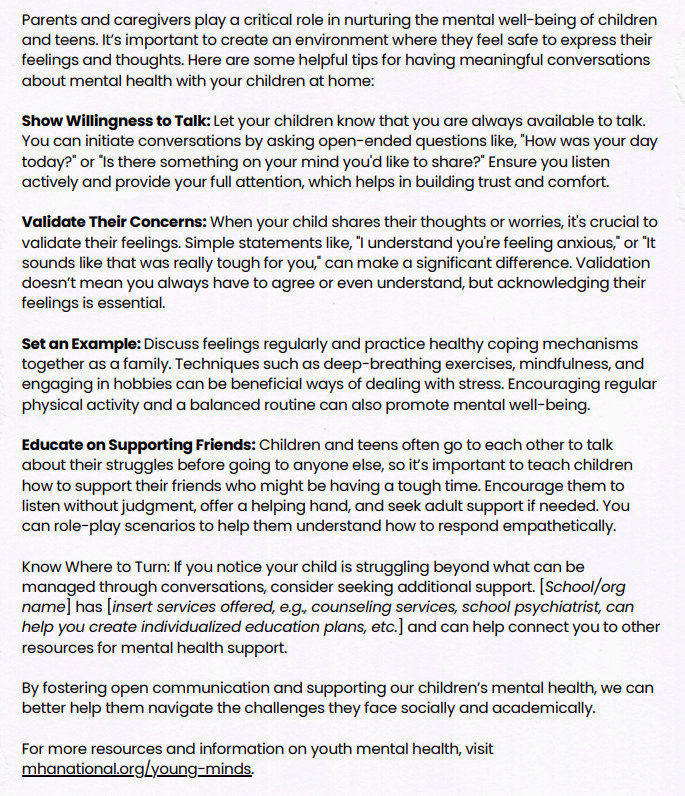Supporting Young Minds: Communications Guide
Youth are facing unprecedented challenges to their mental well-being. Supportive adults can make a significant difference in a young person’s mental health journey.
Mental Health America has prepared materials to empower parents, caregivers, teachers, and others to provide support by fostering nonjudgmental environments where young people feel safe expressing themselves. You will find information about facilitating conversations and validating feelings; classroom activities and resources; and ways to promote peer support.
Thank you for taking the time to educate yourself with these resources. Together, we can support the mental well-being of the next generation.
Key Messages
Feel free to supplement these key messages with the information and tips included throughout this resource guide.
MHA Resources
- Mental Health America (MHA) has developed its 2024 Supporting Young Minds campaign to increase understanding of how empowerment, peer support, and supportive adults play a vital role in addressing and improving youth mental health.
- MHA’s Supporting Young Minds Resource Guide provides information and tools for parents and caregivers, school personnel, and other adults in a young person’s life to use in their work with young people.
- One of the quickest and easiest ways to determine whether someone is experiencing symptoms of a mental health condition is to take an anonymous screen at mhascreening.org
- MHAscreening.org has online screening tools, including one that is youth-focused and one for parents. After taking a screen, Mental Health America will provide you with more information and help you to figure out next steps based on your results.
- Starting the mental health journey doesn’t have to be confusing. Mental Health America’s book, “Where to Start,” breaks down mental health terms in a jargon-free and even humorous way. Youth and adults alike can check on their symptoms, learn how to talk about mental health needs, find out about help options, and discover tips to care for themselves.
Early Identification and Intervention
- Knowing and addressing early signs of mental health conditions can increase the chances of recovery and positive outcomes.
- Because so much time is spent in the classroom, teachers and other school personnel may be the first to notice mental health struggles in students, and it is important to let children and teens know that support is available.
- Consistent support from both home and school can be crucial in helping young people feel secure, understood, and open up about their feelings. However, if a young person isn’t getting that support in one area of their life, having one or a few adults to lean on makes a huge difference.
- School personnel and parents/caregivers can work together to find help for students who need help beyond or in addition to peer support through mental health professionals, such as school psychologists or outside therapists.
Youth Empowerment and Peer Support
- Peer support allows young people to connect with others who understand them and are going through similar experiences, and give hope.
- When young people use their stories, opinions, and experiences to help others they feel validated and empowered.
- Youth peer support can improve the well-being of both the person receiving support and the one providing it by creating opportunities for connection, belonging, and purpose.
- Now more than ever, young people need to feel seen, heard, and valued. Caregivers, school personnel, and other adults can take steps to create relationships and environments where youth feel safe and comfortable expressing themselves.
- Supportive adults can make a significant difference in a young person's mental health journey. Strategic sharing of experiences, when relevant, showing empathy, and listening without trying to fix anything that is happening are a few ways adults can begin to build trust with youth.
- Validating the feelings of young people can have a profound impact on their emotional well-being. When youth have the space to talk about their emotions without judgment and are affirmed when sharing, they develop healthy coping skills and can offer that kind of support to others as they grow.
- Caregivers, school personnel, and others can advocate for mental health curricula and promote opportunities and spaces for peer support training and programs in schools and communities to help youth feel understood and supported.
- Youth mental health programs greatly impact the outcomes of struggling young people, but far too often, youth voices are excluded in designing and implementing initiatives – whether that is creating awareness campaigns or leading youth peer-to-peer programs. Young people should be involved in the creation of youth mental health and peer support programs in their schools and communities.
- Every young person is made up of many dimensions of identity and experiences, which translate to unique needs and ideas for mental health services. Incorporating diverse perspectives into program development helps increase relevance and impact.
Sample Communications
The following sample communications can be customized by schools or community organizations and used in newsletters
or emails to caregivers.
Example #1
Example #2
Social Media
These messages can be used across social media channels year-round and are under the 280-character limit for X.
MHA Resources
- Looking for tools to help address and improve youth mental health? Check out Mental Health America’s 2024 #SupportingYoungMinds Resource Guide for info and tools for adults to use in their work with young people! Learn more at mhanational.org/young-minds
- We’re joining Mental Health America’s #SupportingYoungMinds campaign to help spread the word that empowering young people is key to improving youth mental health. Learn more at mhanational.org/young-minds
- We encourage you to explore tools for parents and caregivers, school personnel, and other adults in a young person’s life in Mental Health America’s 2024 #SupportingYoungMinds Resource Guide. mhanational.org/young-minds
- Young people are our future – let’s empower youth voices in mental health! Visit mhanational.org/youth to find information and opportunities for young mental health advocates. #SupportingYoungMinds
Youth Empowerment
- Validation matters! Give youth the space to talk about their mental health without judgment. mhanational.org/young-minds #SupportingYoungMinds
- Young people feel validated and empowered when they use their stories, opinions, and experiences to help others. Learn more about the impact of youth peer support at mhanational.org/young-minds #SupportingYoungMinds
- Now more than ever, young people need to feel seen, heard, and valued. We urge adults to take steps to create relationships and environments where youth feel safe and comfortable expressing themselves. Learn more at mhanational.org/young-minds #SupportingYoungMinds
- Protect youth mental health, both in the classroom and at home! Learn more and join Mental Health America’s #SupportingYoungMinds campaign at mhanational.org/young-minds
Screening
- Young people should feel empowered to take control of their mental health. Take a free #mentalhealth test at mhascreening.org. #SupportingYoungMinds
- No matter your age, taking a mental health test is one of the easiest ways to check in on your #mentalhealth. Get screened at mhascreening.org. #SupportingYoungMinds
Crisis/Support
- If you or someone you know is struggling or in crisis, help is available. Call or text 988 or chat 988lifeline.org. You can also reach the Crisis Text Line by texting HOME to 741741.
- Teens looking for mental health support can reach out to Teen Line, a hotline of professionally trained teen counselors. Call 800-852-8336 or text TEEN to 839863 (6-10 pm PST).
- Talk to someone who gets it. Mental Health America’s Peer Bridger Program is a free resource for anyone with mental health and addiction needs. Text HELLO to 571-487-7456. The line operates from 10 am to midnight ET, Monday - Friday.
Hashtags
- #SupportingYoungMinds
Links
- mhanational.org/young-minds
- mhanational.org/youth
- mhascreening.org


